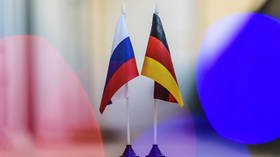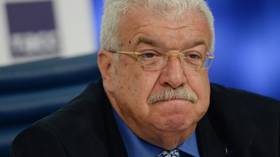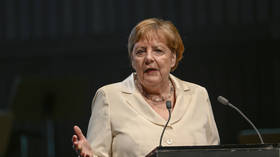Germany’s dangerous Russia gamble

With Merkel out of the picture, Berlin is contemplating a high-stakes shift of policy towards Moscow.
Despite the recent meeting between the presidents of Russia and the US, the fears of many concerning a potential large-scale Russian invasion of Ukraine are not dying down, even if Moscow has consistently denied such plans are afoot. In fact, in Germany, the debate is getting even more intense.
The attitude of the new ruling coalition of Social Democrats (SPD), Greens, and FDP (in essence, the country’s market liberals) still has to fully emerge. In the area of foreign policy, the current crisis over Ukraine is turning into a catalyst for that process. At the same time, the shadow of former chancellor Angela Merkel’s commanding presence is already receding. Even if Germany’s new rulers have repeatedly promised a high degree of continuity in how Berlin handles its relations with the outside world, it is inevitable that some of Merkel’s priorities and strategies are reconsidered.
In addition, the current war scare in the East may frighten Ukrainian politicians as much as they say, but they, clearly, also recognize an opportunity. Inevitably, this is a promising moment to make more demands for Western support. As the US is ruling out direct military intervention against Russia, Kiev is seeking, in essence, compensation.
Against this background, Germany’s public opinion is becoming an important arena in a struggle over what the Germans call ‘Deutungshoheit’, that is, the authority to interpret, and therefore define what is to be done: For representatives of the Ukrainian government and those who sympathize with it, this is the right time to try to shake the cautious and carefully balanced policy imposed by Merkel. Thus, there was an attempt to make a scandal out of a recent revelation that it was Berlin – still under her leadership – that blocked some arms deliveries to Kiev. Ukrainian President Volodymyr Zelensky himself has publicly accused the German government of preventing Ukraine from acquiring defensive weapons. He has surmised that the reason is “fear” (of, he clearly means to imply, Russia).
The Ukrainian ambassador in Berlin, Andriy Melnyk, well-known for provocative and undiplomatic statements, went further and diagnosed Germany with a case of “pathological fear of Putin.” In his view, this state of mind is responsible for Germany’s failure not only to allow Kiev to acquire certain arms, but also to generally exert maximum pressure on Russia, including through canceling Nord Stream 2. Melnyk’s boss, Ukrainian Minister of Foreign Affairs Dmitry Kuleba, has also voiced his dissatisfaction with German policy. He finds Berlin’s attitude toward Ukraine’s plans to join NATO “extremely skeptical.”
Meanwhile, another key minister has amplified the message: Aleksey Reznikov, Ukraine’s minister of defense, has also gone public – in the Financial Times, no less – to denounce Berlin’s behavior as “very unfair.” While not letting go of Nord Stream 2, Reznikov has complained, Germany’s leadership is keeping Kiev from obtaining anti-drone rifles and anti-sniper systems via NATO procurement channels. The mayor of Kiev and former boxing champion, Vitaly Klitschko, has also made use of his considerable popularity to appeal for support from Germany. He has particularly singled out the country’s new government, which, according to Klitschko, must understand that Ukraine now needs help like never before.
Clearly, something of a PR offensive is underway, censuring Germany for not yet doing enough for Ukraine and pushing its public opinion and new leadership to do more, with respect to facilitating military supplies, the promotion of Kiev’s (misguided) NATO ambitions, and confronting Russia. In particular, Merkel’s policy of not allowing Ukraine to acquire lethal weapons via NATO is under fire. While Kiev has been able to acquire such arms bilaterally, for instance from the US, to obtain them through the procurement channels of the Western bloc is only possible when all NATO members agree to each delivery.
There is some success: Germany has already relented regarding some of the arms supplies which it had blocked. German media tend to reproduce and reinforce the Ukrainian message. The very influential, if low-quality, mass publication Bild has joined the fray on Kiev’s side. So have the slightly more serious Stern magazine and the grand old dame of German newspapers, the very serious Frankfurter Allgemeine Zeitung; the latter with an op-ed recognizing that it is generally problematic to deliver weapons to conflict zones, but insisting that this should be the exception. In the case of Ukraine, so the argument goes, not providing “arms for self-defense” would amount to a morally remiss failure to help (‘unterlassene Hilfeleistung’ in the original German, a term that also implies criminal responsibility).
This rising current in Germany’s public sphere is especially important because of the fact that the German Greens have great, if uncritical, sympathy for Kiev: Senior Green politician Robert Habeck, now vice chancellor as well as heading a new super-ministry of the economy and climate action, has long been on record questioning Germany’s reticence to deliver more and more powerful weapons to Ukraine. Another Green leader, the new foreign minister, Annalena Baerbock, has told her Russian counterpart, Sergey Lavrov that Ukraine’s “territorial integrity must not be violated” and joined the Western chorus warning Russia of “massive” economic and diplomatic consequences in case of a large-scale invasion of Ukraine.
In general, Baerbock promises a foreign policy that – somehow – is supposed to honor “values” more than before. It is clear that for her, Russia (and China) are the main ‘baddies’ that such a (self-)righteous policy must demonstratively stand up to. What is unclear – and will probably remain so forever – is why Baerbock has no ‘values’ issues with Israel, an apartheid state systematically trampling the rights of Palestinians; and the US and UK, together slowly torturing to death Julian Assange, today’s single most important political prisoner.
Against this background, it is no surprise that Baerbock has already warned that Nord Stream 2 cannot be certified – that is, start working – at this point. In case of a Russian invasion, again, she threatens its complete demise. She has, however, also left herself a backdoor open, clearly implying that the pipeline might still pass muster with requisite changes to its legal framework and if, of course, peace prevails.
We are witnessing an obvious push for ending Berlin’s well-balanced policy toward the Ukraine crisis as long shaped by former Chancellor Merkel. There are some reasons why it may succeed in changing government policy. Yet two points militate against such a change: First of all, the Greens are not the senior partner in Berlin’s ruling coalition. That is the SPD, which, as of now, does not seem to be ready for a principal reassessment of its attitude toward Russia. But that would be required for a change of policy toward Ukraine.
There is a fallacy in the argument that Berlin should arm Ukraine more aggressively because we imagine that a major Russian invasion could potentially occur. In reality, stepping up weapons deliveries now could escalate the conflict, even if that is a reality that the supporters of such a policy change are loath to admit. Even on their premises, it would be wiser to warn that more arms for Ukraine would follow on an invasion if it ever materialized, and not precede one that may never occur. That would constitute a real disincentive while not running a new risk of escalation. A war scare, in any case, is not the right moment to make long-term changes in policy.
The statements, views and opinions expressed in this column are solely those of the author and do not necessarily represent those of RT.
The statements, views and opinions expressed in this column are solely those of the author and do not necessarily represent those of RT.














